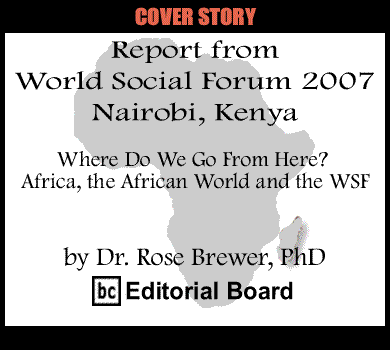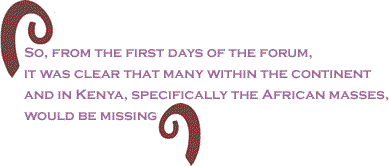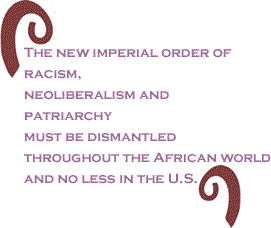Where Do We Go From Here? Africa, the African Worls and the WSF


Dr. Brewer attended the WSF forum in Nairobi, Kenya as a news correspondent for BlackCommentator.com.
It is clear that that the meaning of the World Social Forum for Africa and the African world will be debated for quite awhile. There clearly is no straightforward or easy answer to its meaning for African peoples. What is true is that it was an event which brought between 50,000 to 60,000 attendees to the continent. Unfortunately, about 90% of these were not from Africa, but heavily North American and European. So, from the first days of the forum, it was clear that many within the continent and in Kenya, specifically the African masses, would be missing. This meant that an African voice of the poorest, the most dispossessed was not nearly present enough. Indeed as those in attendance debated the contours of another world, the Horn of Africa and U.S. complicity in that conflict was raging. Somalia was occupied but it certainly was not front and center to the deliberations, nor the fact that the Kenyan government is a “friend of the U.S.” in its “war on terrorism.” Importantly, Grassroots Global Justice, a group of about 70 grassroots activist organizations from the U.S., protested the U.S. attack on Somalia and the war in Iraq on the 4th day of the forum. This was an important expression of condemnation of U.S. actions in Iraq and the Horn from delegates from the U.S.

Indeed, the spirit of resistance was alive, especially among African youth. As Davey D., a GGJ delegate, recently pointed out in a report on the forum, “those who had the least were the most organized”, referring to the resistive spirit in the midst of the threat to life and limb of the young people who dared challenge. In fact, two of the youth involved in the protests were killed under mysterious circumstances by the Kenyan police, Davey D reported.
Clearly the contradictions were real: a forum for the "have nots” and the few, and yet, too many of the few and the have-nots could claim it and own it. Nonetheless, for all of us who were there of African descent to see the consequences of colonialism, imperialism and the neocolonial and neoliberal order of globalism is absolutely essential to our struggle here in the U.S. The call for global social movements to combat these realities was the ongoing mantra and commitment of the forum. This commitment has widespread implications for Africa and the African world. While too few African Americans were present at the forum, it was quite evident that our struggles are interconnected; that where we go from here is to building a movement for social change within the belly. The new imperial order of racism, neoliberalism and patriarchy must be dismantled throughout the African world and no less in the U.S. This point was clearly made by two younger women activists from the Oakland Malcolm X Grassroots Movement. They pointed out that people of the continent and the African Diaspora are suffering because of these global systems. Akua Jackson and Liz Derias spoke forthrightly about their experiences at the forum. The most significant experiences for them involved going into the Korogocho slums and working with that community. It was a powerful experience. It absolutely connects, to building self-determination and a Black movement in the U.S. and globally, the women asserted. They also understood the challenges confronting the African world, strengthening their commitment to Pan Africanism. They experienced amazing political and connective moments. It was powerful for them to be on the continent, especially connecting to the many young people there. The forum helped them to sharpen their sense of the political work that needs to be done in the U.S.

In closing, the spirit of African resistance was captured on the 4th day at the Social Movements Assembly. The Peoples Parliament of Kenya spoke powerfully to what confronts Africa and the African world. This group represents the poorest constituency in Kenya. They said:
1. They were concerned that many Kenyans have not been able to attend.
2. They came every single morning “to get these doors open so that ordinary Kenyan citizens could attend.”
3. They created an alternative forum at Javanjee Park and discussed housing, unemployment, land issues, the right to social security, etc.
4. African freedom fighters have been labeled terrorist. This has occurred in the context of righteous resistence to the intertwined systems of neocolonialism, imperialism, empire. We must resist this labeling.
5. The violence against women and the protest against the horrors of rape, violence, homophobia, and inequality must be put into bold relief.
6. Despite the difficulties, social movements across the continent were able to make some connections.
7. Thus, in the midst of tremendous contradictions, the WSF was a site of resistance and struggle.
8. Concretely there will be a series of global actions in 2007 and 2008 central to Africa and the African world, including the October 14-21, 2007 Days of Action Against Debt.
10. Recognizing the Oct 15, 20th anniversary of the death of Thomas Sankara and the Resistance to War and Occupation, in June 2007 G8 Protests in Rostock Germany.
From June 27 to July 1 there will be the first United States Social Forum in Atlanta, GA. Go to ussf2007.org for further details.
BC Editorial Board Member, Dr. Rose Brewer, PhD, is a professor of African American/African Studies at the University of Minnesota and a leader of the Black Radical Congress.
